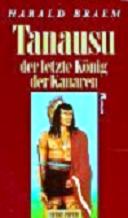
Tanausu
Encyclopedia

Guanches
Guanches is the name given to the aboriginal Berber inhabitants of the Canary Islands. It is believed that they migrated to the archipelago sometime between 1000 BCE and 100 BCE or perhaps earlier...
ruler of Aceró, on the island of La Palma
La Palma
La Palma is the most north-westerly of the Canary Islands. La Palma has an area of 706 km2 making it the fifth largest of the seven main Canary Islands...
(known to the original population as Benahoare
Benahoare
Benahoare was the native Guanche name for the Spanish island of La Palma, one of the Canary Islands. Prior to its conquest by the Castilians, completed in 1493, the island had been divided into 12 cantons or lordships. The last Guanche lord to submit to European rule was Tanausu...
), whose defeat by the Castilians
Crown of Castile
The Crown of Castile was a medieval and modern state in the Iberian Peninsula that formed in 1230 as a result of the third and definitive union of the crowns and parliaments of the kingdoms of Castile and León upon the accession of the then King Ferdinand III of Castile to the vacant Leonese throne...
marked the final conquest of that island. The island of Tenerife
Tenerife
Tenerife is the largest and most populous island of the seven Canary Islands, it is also the most populated island of Spain, with a land area of 2,034.38 km² and 906,854 inhabitants, 43% of the total population of the Canary Islands. About five million tourists visit Tenerife each year, the...
, conquered in 1495, was the last of the Canary Islands
Canary Islands
The Canary Islands , also known as the Canaries , is a Spanish archipelago located just off the northwest coast of mainland Africa, 100 km west of the border between Morocco and the Western Sahara. The Canaries are a Spanish autonomous community and an outermost region of the European Union...
to fall under European control. His name has been translated as "The obstinate" or "He who has kidneys."http://www.microlapalma.com/personajes/
Aceró, whose name is said to mean "strong place" in Guanche
Guanche language
Guanche is an extinct language that was spoken by the Guanches of the Canary Islands until the 16th or 17th century. It is only known today through a few sentences and individual words recorded by early travellers, supplemented by several placenames, as well as some words assimilated into the...
, has been identified with the area now known as La Caldera de Taburiente, which indeed lends itself to a strong defense.
He was the last king of La Palma to submit himself to the Castilian forces led by Alonso Fernández de Lugo
Alonso Fernández de Lugo
Javier Alonso Luis Fernández de Lugo was a Spanish military man, conquistador, city founder, and administrator. He conquered the islands of La Palma and Tenerife for the Castilian Crown; they were the last of the Canary Islands to be conquered by Europeans. He was also the founder of the towns...
. The Castilians had failed twice in their attempts to penetrate the region known as La Caldera. A truce, with a promise of gifts and good treatment, was arranged by Fernández de Lugo through Juan de Palma, a relative of Tanausu who had converted to Christianity
Christianity
Christianity is a monotheistic religion based on the life and teachings of Jesus as presented in canonical gospels and other New Testament writings...
. The truce, to which Tanausu had agreed, led to the king's capture in an ambush. He was convinced to come out on the pass known as Adamacansis, and was ambushed on the spot now known as El Riachuelo, near present-day La Cumbrecita.
Tanausu was taken away to be presented to Ferdinand and Isabella. In defiance, Tanausu is said to have refused to eat during the voyage to Spain
Spain
Spain , officially the Kingdom of Spain languages]] under the European Charter for Regional or Minority Languages. In each of these, Spain's official name is as follows:;;;;;;), is a country and member state of the European Union located in southwestern Europe on the Iberian Peninsula...
, and he died without seeing land again.
The scholar Harald Braem wrote a book called Tanausu, König der Guanchen ("Tanausu, King of the Guanches", available in German and Spanish, editorial Verena Zech, Tenerife 2005).

